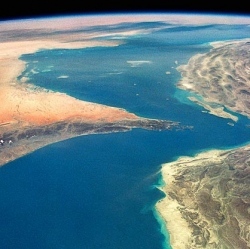
Russia’s main contractor in human space flight just detailed its plans to separate the newest modules from the International Space Station (ISS) once the long-lived project comes to an end in the 2020s. It plans to build a new habitable base in Earth orbit called the Russian Orbital Station, or ROS.
The outpost will include three modules initially, possibly joined by two more in the future. Russian plans to split the ISS have been circulating for years. Now, for a host of political, financial, and technical reasons, this isn’t just a wild idea on paper anymore.
The ISS has been a hallmark, perhaps the hallmark, of post-Cold War cooperation between the US, Russia, Europe, Japan, and Canada for more than two decades. But as its retirement looms, the partners have failed to strike a concrete deal about where to go next.
NASA has been slowly building a deep-space exploration program that all but excludes Russia. Back on Earth, the political relations between U.S. and Russia are going in the gutter, complete with American sanctions against Russia and Russian fighter jets buzzing American warships.
One more big problem for the space station is that Russian efforts to complete its segment of the ISS have been stalled for years, first by poor quality control and then by the financial crisis.
This month, reports surfaced that the launch of the Multi-Purpose Module, or Nauka (Russian for "science"), had been pushed back by another six months to December 2017. Given the complexity of the 20-ton behemoth, one can bet there will be more delays before Nauka reaches the launch pad.
It would make little sense to launch such an expensive spacecraft just few years before the ISS is scheduled to be retired and plunged into the ocean sometime in mid-to-late 2020s.
But even with all their problems on the ground, Russians proved with the ISS (and previously with Mir) that their hardware can keep crews safe for in orbit for decades. Consider those two factors together and here comes the idea for the all-Russian Orbital Station.
According to RKK Energia, the prime Russian contractor on the ISS, the new outpost would begin with the separation of the Nauka from the rest of the old station in mid-2020s. By that time, Nauka should have two even newer modules in tow.
One would be the so-called Node Module, a tinker-toy-like component that could connect to six other modules, crew ships, cargo tankers, structural elements, you name it. The Node Module is already in RKK Energia’s garage and ready to go within a few months after the Nauka.
Next would be the new Science and Power Module (NEM) which, as it name implies, will finally give cosmonauts a state-of-the-art science lab and a pair of large solar arrays, making the Russian segment fully independent from the rest of the ISS in terms of power, communications, and other resources. The launch of NEM, currently promised as early as 2019, would set the stage for these three components to leave the ISS to form ROS.
And then Russia could add on. Someday, Russian engineers hope, they will outfit the Russian station with its own inflatable habitat and with a roomy airlock for spacewalks. Crews could be delivered to the new station onboard veteran Soyuz spacecraft or by a new-generation transport ship, which is currently in development.
Right now the future Russian station is only a plan, not an official strategy approved by the Kremlin. But Russian engineers want to make sure that the nation’s cosmonauts have a destination in space in case all other options on the table do not pan out. Ironically, Russian space officials also left door open for other nations to join the project, an idea that so far has had a mixed reception at NASA and ESA.
